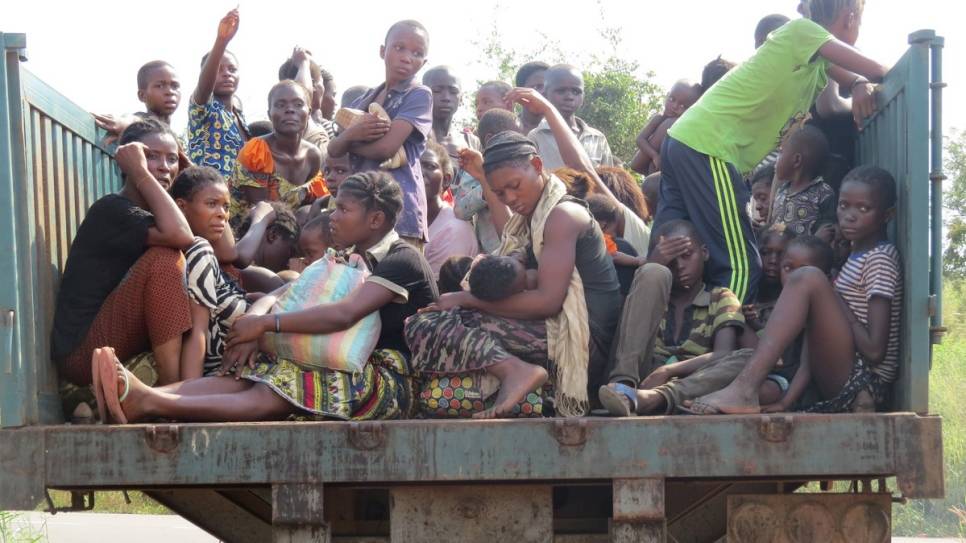Update: Over 20,000 DRC refugees in Angola

Update: Over 20,000 DRC refugees in Angola
UNHCR, 12 May 2017
URL: http://www.unhcr.org/news/briefing/2017/5/591571ed4/update-20000-drc-refugees-angola.html
Some 20,563 refugees have now arrived in Angola, fleeing insecurity and violence in the Democratic Republic of Congo’s Kasai region since early April. A steady stream of refugees continue to cross into Dundo in Lunda Norte Province. More than 3,000 have arrived in the last few days
The Angolan army is transporting the new arrivals from border points to the two receptions centres in Cacanda and Moussunge.
The recent arrivals included people with severe wounds and burn injuries, who have been transferred to a local hospital to receive urgent medical attention. A local hospital is already assisting some 70 persons with serious wounds and burn injuries.
Refugee reception centres in Angola are already over-crowded and struggling to accommodate daily arrivals. UNHCR is currently assisting the Angolan authorities to identify a suitable site for the relocation of refugees from the temporary reception centres.
UNHCR continues to provide food and relief items to new arrivals. UNHCR partners are pitching tents and distributing plastic sheeting to provide adequate shelter, prioritizing the most vulnerable people.
UNHCR and partners, in support of the Angolan authorities, have pre-registered so far over 11,000 persons, 70 per cent women and children. UNHCR, in coordination with UNICEF, is responding to an increasing number of unaccompanied and separated children who require immediate attention.
Aid from a second UNHCR airlift arrived in Dundo on 8 May with 1,200 family tents, 1,500 plastic sheeting, 500 plastic rolls, and 3,000 solar lanterns are currently being unloaded in preparation for distribution.
UNHCR is currently assisting the Angolan authorities to identify a suitable site for the relocation of refugees from the temporary reception centres. We are advocating for a site at least 50 kilometres from the border.
UNHCR is appealing for USD 6.5 million to provide immediate lifesaving assistance, including food, nutrition, health and relief items for refugees.
For more information on this topic, please contact:
In Geneva, Babar Baloch, baloch@unhcr.org, +41 79 513 95 49
In Pretoria, Markku Aikomus, aikomus@unhcr.org, +27(0)81 797 7456
The Angolan army is transporting the new arrivals from border points to the two receptions centres in Cacanda and Moussunge.
The recent arrivals included people with severe wounds and burn injuries, who have been transferred to a local hospital to receive urgent medical attention. A local hospital is already assisting some 70 persons with serious wounds and burn injuries.
Refugee reception centres in Angola are already over-crowded and struggling to accommodate daily arrivals. UNHCR is currently assisting the Angolan authorities to identify a suitable site for the relocation of refugees from the temporary reception centres.
UNHCR continues to provide food and relief items to new arrivals. UNHCR partners are pitching tents and distributing plastic sheeting to provide adequate shelter, prioritizing the most vulnerable people.
UNHCR and partners, in support of the Angolan authorities, have pre-registered so far over 11,000 persons, 70 per cent women and children. UNHCR, in coordination with UNICEF, is responding to an increasing number of unaccompanied and separated children who require immediate attention.
Aid from a second UNHCR airlift arrived in Dundo on 8 May with 1,200 family tents, 1,500 plastic sheeting, 500 plastic rolls, and 3,000 solar lanterns are currently being unloaded in preparation for distribution.
UNHCR is currently assisting the Angolan authorities to identify a suitable site for the relocation of refugees from the temporary reception centres. We are advocating for a site at least 50 kilometres from the border.
UNHCR is appealing for USD 6.5 million to provide immediate lifesaving assistance, including food, nutrition, health and relief items for refugees.
For more information on this topic, please contact:
In Geneva, Babar Baloch, baloch@unhcr.org, +41 79 513 95 49
In Pretoria, Markku Aikomus, aikomus@unhcr.org, +27(0)81 797 7456